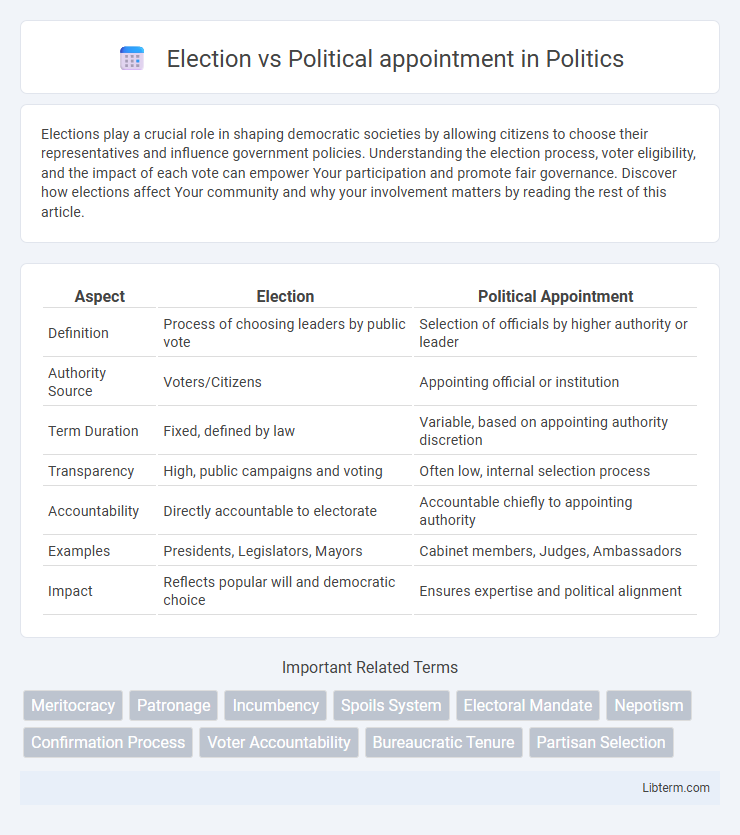Elections play a crucial role in shaping democratic societies by allowing citizens to choose their representatives and influence government policies. Understanding the election process, voter eligibility, and the impact of each vote can empower Your participation and promote fair governance. Discover how elections affect Your community and why your involvement matters by reading the rest of this article.
Table of Comparison
| Aspect | Election | Political Appointment |
|---|---|---|
| Definition | Process of choosing leaders by public vote | Selection of officials by higher authority or leader |
| Authority Source | Voters/Citizens | Appointing official or institution |
| Term Duration | Fixed, defined by law | Variable, based on appointing authority discretion |
| Transparency | High, public campaigns and voting | Often low, internal selection process |
| Accountability | Directly accountable to electorate | Accountable chiefly to appointing authority |
| Examples | Presidents, Legislators, Mayors | Cabinet members, Judges, Ambassadors |
| Impact | Reflects popular will and democratic choice | Ensures expertise and political alignment |
Understanding Elections: Definition and Purpose
Elections are formal processes in which citizens vote to choose representatives or decide on public policies, ensuring democratic participation and legitimacy in governance. Unlike political appointments, which are typically made by elected officials or government leaders based on qualifications or loyalty, elections provide a direct mechanism for the public to influence government composition and policy direction. The purpose of elections is to uphold accountability, represent the electorate's preferences, and enable peaceful transitions of power.
Political Appointments Explained
Political appointments refer to positions filled by individuals selected by elected officials, often based on expertise, loyalty, or policy alignment, rather than by public vote. These roles include cabinet members, agency heads, and advisory boards, playing a crucial role in implementing government policies and administration. Unlike elections, political appointments allow for swift placement of qualified personnel to execute specific governmental functions effectively.
Key Differences Between Elections and Political Appointments
Elections involve a voting process where citizens select candidates for public office, emphasizing democratic participation and legitimacy through majority support. Political appointments are decisions made by government officials or leaders to fill key positions, often based on expertise, loyalty, or political strategy rather than direct public vote. The key differences lie in the source of authority--public mandate in elections versus executive discretion in appointments--and the methods of accountability and transparency associated with each system.
Accountability: Elected Officials vs Appointed Officials
Elected officials are directly accountable to voters through regular elections, ensuring their decisions reflect public interests and enabling removal via democratic processes. Appointed officials answer primarily to the appointing authority, which can limit direct public accountability but may enhance specialization and continuity in governance. The accountability of elected officials centers on transparency and responsiveness to constituents, whereas appointed officials emphasize expertise and adherence to policy directives from higher authorities.
Selection Process: Public Vote or Government Nomination?
Elections involve a public vote where citizens directly select candidates, ensuring democratic participation and accountability. Political appointments rely on government nomination, where officials are chosen based on qualifications, loyalty, or political strategy without direct public involvement. This distinction in selection process fundamentally shapes the legitimacy and responsiveness of the appointed individual or elected official.
Transparency in Elections and Political Appointments
Transparency in elections ensures that voting processes, candidate qualifications, and ballot counts are open to public scrutiny, fostering trust and accountability in democratic systems. Political appointments often lack equivalent transparency, as selection criteria and decision-making processes may be confined to internal party mechanisms or executive discretion. Enhancing transparency in appointments through clear guidelines and public disclosures can improve legitimacy and reduce corruption risks in governance.
Pros and Cons of Elections
Elections provide a direct means for citizens to choose leaders, promoting democratic accountability and legitimacy through widespread voter participation. However, elections can be influenced by campaign financing, partisan polarization, and voter suppression, which may undermine fairness and representativeness. Despite these challenges, elections often lead to greater public engagement and transparency compared to political appointments.
Pros and Cons of Political Appointments
Political appointments offer the advantage of selecting qualified individuals aligned with the administration's goals, ensuring cohesive policy implementation and streamlined decision-making. However, this system risks favoritism, reduced accountability, and potential exclusion of diverse perspectives, which can undermine public trust and democratic representation. The lack of direct voter input in political appointments may lead to perceptions of elitism and diminished legitimacy compared to elected officials.
Impact on Governance and Public Trust
Elections enhance governance by promoting accountability, as elected officials are directly answerable to voters, fostering transparency and responsiveness to public needs. Political appointments, while allowing for expertise and continuity in administration, may risk reduced public trust if perceived as driven by patronage or lacking democratic legitimacy. Balancing elected representatives with qualified appointees is essential to maintaining effective governance and sustaining citizen confidence.
Choosing the Right System for Effective Leadership
Election provides a democratic platform ensuring leaders reflect the popular will through voting, fostering accountability and transparency in governance. Political appointment allows selection based on expertise, qualifications, or party loyalty, enabling efficient placement of specialized talents in key positions. Balancing electoral legitimacy with merit-based appointments supports effective leadership by combining public trust with professional competence.
Election Infographic

 libterm.com
libterm.com